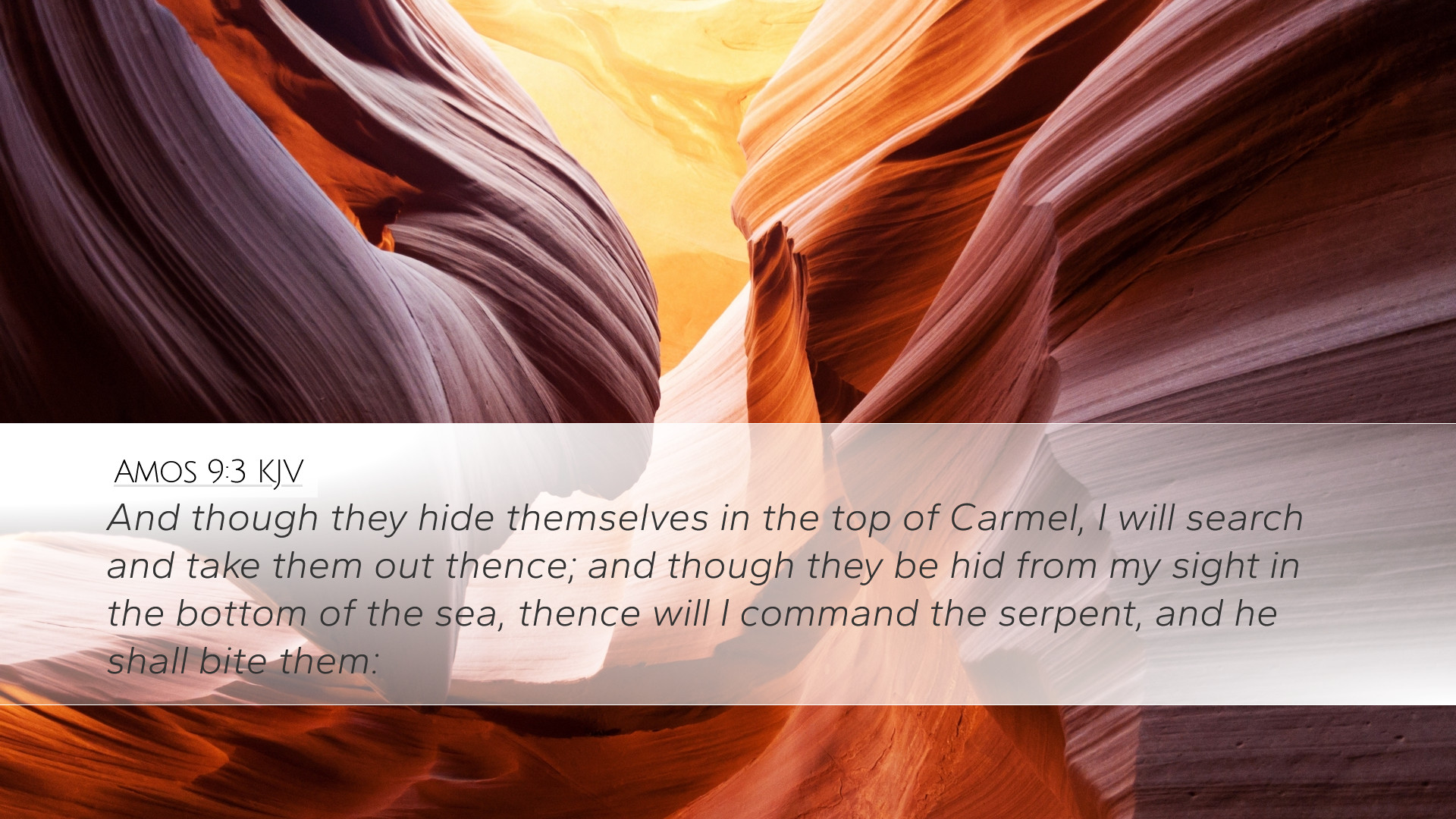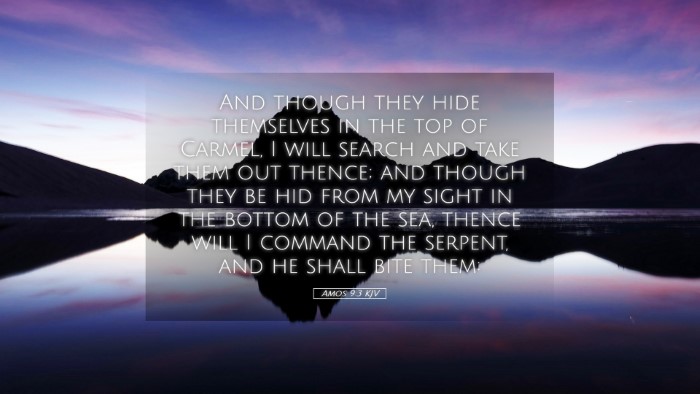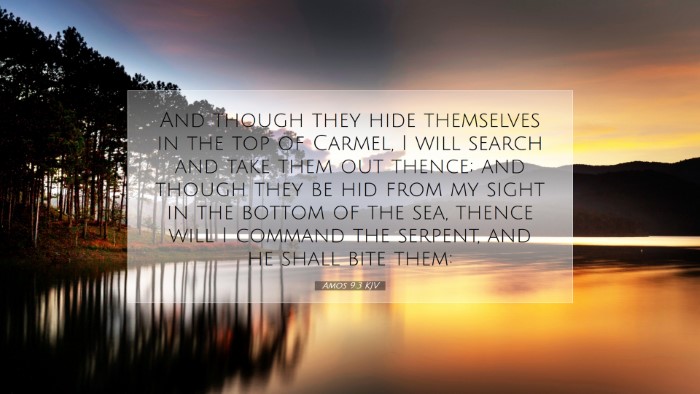Old Testament
Genesis Exodus Leviticus Numbers Deuteronomy Joshua Judges Ruth 1 Samuel 2 Samuel 1 Kings 2 Kings 1 Chronicles 2 Chronicles Ezra Nehemiah Esther Job Psalms Proverbs Ecclesiastes Song of Solomon Isaiah Jeremiah Lamentations Ezekiel Daniel Hosea Joel Amos Obadiah Jonah Micah Nahum Habakkuk Zephaniah Haggai Zechariah MalachiAmos 9:3
Amos 9:3 KJV
And though they hide themselves in the top of Carmel, I will search and take them out thence; and though they be hid from my sight in the bottom of the sea, thence will I command the serpent, and he shall bite them:
Amos 9:3 Bible Commentary
Commentary on Amos 9:3
Amos 9:3 states:
"And though they hide themselves in the top of Carmel, I will search and take them out thence; and though they be hid from my sight in the bottom of the sea, I will command the serpent, and he shall bite them."
Contextual Overview
The Book of Amos emphasizes God's judgment against Israel for its social injustices and religious hypocrisy. Amos, a shepherd and farmer, conveyed God’s messages of dire consequences if the people did not return to justice and righteousness. The concluding chapter is a declaration of God's sovereignty over all creation, showcasing that no one can escape His judgment.
Verse Analysis
This verse highlights God’s omniscience and omnipotence. The imagery used illustrates how futile it is for humans to attempt to escape from God's reach. Let us delve into insights from notable commentaries.
-
Matthew Henry Commentary:
Henry emphasizes the futility of trying to evade divine justice, noting that even the highest peaks of Carmel cannot shield individuals from God's awareness. He suggests that Israel's leaders, hiding from accountability, cannot escape the divine scrutiny that will bring judgment. Furthermore, Henry interprets the “serpent” as a metaphor for God's sovereignty, illustrating that even the depths of the sea will not offer refuge from God’s intentions.
-
Albert Barnes Notes on the Bible:
Barnes points out that God’s omnipresence ensures that all attempts to flee from Him are in vain. He notes that hiding in the vastness of the sea or the heights of mountains only serves to emphasize the inescapability of God's justice. Barnes interprets “the serpent” as a representation of divine judgment, underscoring that even the most remote places on earth are under God's jurisdiction, and His command is ultimate.
-
Adam Clarke’s Commentary:
Clarke provides a vivid illustration of God's relentless pursuit of sinners. He explains that even if one were to climb to the highest heights or plunge to the sea's depths, God’s hand would still reach them as His presence fills all places. The “serpent” can also symbolize evil; thus, God can utilize any means necessary to execute His judgment. Clarke reinforces that there is not a single place where God's gaze does not reach, exemplifying both His power and desire for moral order.
Theological Implications
The theological implications of Amos 9:3 raise essential questions about the nature of God’s justice and the human condition. Throughout these commentaries, we find recurring themes of divine omnipotence and the seriousness of accountability.
-
God’s Omnipresence:
The verse magnificently reflects God's omnipresence, reminding believers that there is no escape from God's watchful gaze. This should invoke both reverence and fear of the Lord among His people, compelling them towards repentance and humility.
-
The Nature of Judgment:
The mention of the “serpent” implies that God not only sees but can enact judgment through various means. His power transcends natural barriers, reflecting a divine authority over all creation.
-
Human Accountability:
This passage serves as a reminder that refusal to pursue righteousness and justice leads individuals to ultimately face the consequences of their actions, highlighting the integral relationship between faith and works in the believers’ life.
Application for Pastors and Theologians
For pastors and theologians, Amos 9:3 serves as a critical exhortation to emphasize God's holiness and justice in preaching. The unavoidable nature of divine judgment should motivate leaders to advocate for a life of piety and social integrity within their congregations.
-
Encouragement to Repentance:
Use this verse to call believers to acknowledge the areas in their lives where they may be trying to hide from God, encouraging open confession and the pursuit of holiness.
-
God’s Sovereignty:
The omnipotence displayed in this verse can be preached to instill confidence in God's ultimate control over all affairs. This should bring comfort amidst chaos, affirming faith in God’s purposes.
-
Social Justice Teachings:
Highlight the responsibilities believers have towards justice and righteousness. The implications of inescapable divine judgment should awaken social consciousness and action against injustices in society.
Conclusion
Amos 9:3 stands as a powerful reminder of the inescapability of divine judgment. Through the wisdom of eminent commentators, we recognize the inextricable link between God's omniscience and human accountability. It prompts believers to reflect on their spiritual walk and reassures them of God’s sovereign hand in all circumstances. Thus, it is a call to vigilance, repentance, and solid trust in the righteousness of our Creator.


